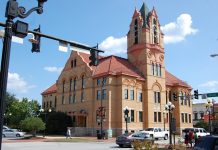By Stan Welch
Approximately twenty five people attended a public meeting held Monday at the Wren Fire Department to hear county officials talk about the proposed county road fee.
County Council Chair Tommy Dunn, County Council member James Davis (D6), who hosted the meeting were joined by county administrator Rusty Burns, roads and bridges director Matt Hogan, and county finance director Rita Davis, as they explained the proposed fee and answered questions from the audience.
Davis conceded that he considered the fee a tax. “You can call it what you will. I think it’s a tax. But we have to do something, and we need to get started.” Davis expressed support for the road fee, pointing out that it will be a dedicated amount. “Currently, up to seventy five per cent of the ad valorem taxes collected by the county go to the schools and the fire departments, and first responders.” The county is responsible for 1,354 miles of roads. The state is responsible for approximately 1300 miles as well.
Predictably, Davis reiterated that the General Assembly cut the tax ratio by four and a half percent on vehicles several years ago, severely impacting the revenues received by the counties. She stressed that the fee would be used for nothing but paving and roads and bridges. Matt Hogan told the crowd that there are currently 82 miles of roads in the county that fall into the ‘failing’ category. “Those roads will be very expensive to reclaim, and the next category up contains roads that are beginning to fail.”
The fee would have to be reinstated by vote of the council every four years, and the funds would undergo a separate audit each year. It could be structured a couple of different ways. With exemptions for those sixty four years or older, and for those with certified handicap tags, the fee would be twenty five dollars per registered vehicle. Without those exemptions, the fee would be twenty dollars. Twenty six of the state’s forty six counties, or fifty seven per cent, have such fees. Those fees average $27.25 per vehicle.
Chairman Tommy Dunn pointed out that another problem exists in getting the roads repaired. He explained that during the recession several years ago, a lot of paving contractors went out of business. “So there aren’t a lot of people around doing this kind of work. So prices go up, even while expertise goes down.”
















